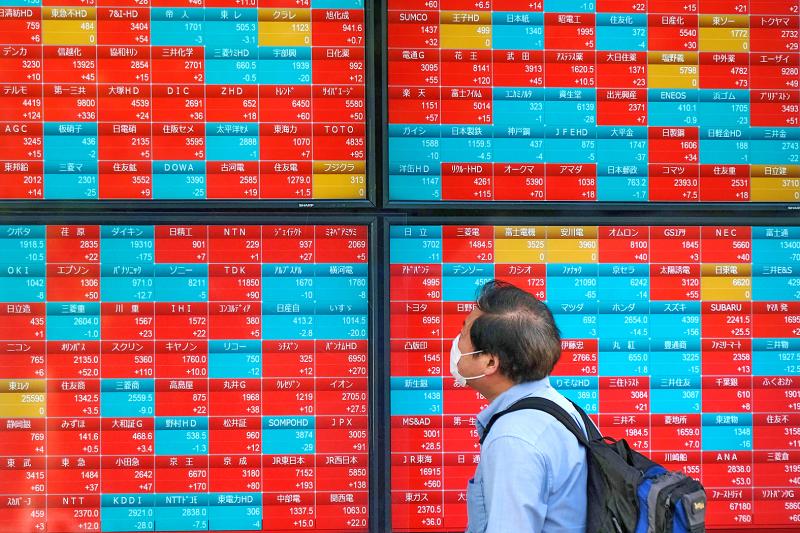Asian shares were mixed on Friday following a sell-off of technology shares on Wall Street.
In Taipei, the TAIEX closed down 0.12 percent at 12,675.95 on turnover of NT$189.942 billion, but was up 0.3 percent from 12,637.95 a week earlier.
Japan’s benchmark Nikkei 225 recouped early losses to rise 0.74 percent to 23,406.49, gaining 0.87 percent for the week. The broader TOPIX rose 0.72 percent to 1,636.64 for a weekly increase of 1.24 percent.

Photo: AFP
South Korea’s KOSPI gained 0.01 percent to 2,396.69, increasing 1.2 percent from a week earlier, while Australia’s S&P/ASX 200 lost 0.83 percent to 5,859.4, dropping 1.12 percent for the week.
Hong Kong’s Hang Seng gained 0.78 percent to 24,503.31, while the Shanghai Composite rose 0.79 percent to 3,260.35.
However, the Hang Seng and the Shanghai Composite were both down from a week earlier, losing 0.78 percent and 2.83 percent respectively.
Analysts say that investors are preoccupied with the COVID-19 pandemic and hopes for development of a safe, effective vaccine.
While Big Tech is benefiting from the shift to online life that the pandemic and stay-at-home economy has accelerated, critics said that their stocks prices have surged too high.
“Big tech stocks might have seemed like safe havens, but they have found themselves at the center of a brutal sell-off,” AxiCorp Financial Services Pty chief global market strategist Stephen Innes said.
The catch is that progress in curbing COVID-19 could hurt technology shares, Innes said.
The latest gyrations on Wall Street followed a wild stretch where the S&P 500 careened from its worst three-day slump since June to its best day in nearly three months.
The selling came as the odds lengthen that the US Congress will deliver more aid to the economy before November’s elections, support that many investors say is crucial after US federal unemployment benefits and other stimulus expired.
Partisan disagreements on Capitol Hill have kept Congress at a seeming impasse.
ING Group senior economist Nicholas Mapa said that risk aversion is dominating Asian trading with the technology sector weighing on overall sentiment.
He said that “investors are struggling to find a catalyst to reverse the recent downtrend with the much-anticipated US fiscal stimulus bill still in limbo.”
Additional reporting by staff writer

South Korea’s equity benchmark yesterday crossed a new milestone just a month after surpassing the once-unthinkable 5,000 mark as surging global memory demand powers the country’s biggest chipmakers. The KOSPI advanced as much as 2.6 percent to a record 6,123, with Samsung Electronics Co and SK Hynix Inc each gaining more than 2 percent. With the benchmark now up 45 percent this year, South Korea’s stock market capitalization has also moved past France’s, following last month’s overtaking of Germany’s. Long overlooked by foreign funds, despite being undervalued, South Korean stocks have now emerged as clear winners in the global market. The so-called “artificial intelligence

‘SEISMIC SHIFT’: The researcher forecast there would be about 1.1 billion mobile shipments this year, down from 1.26 billion the prior year and erasing years of gains The global smartphone market is expected to contract 12.9 percent this year due to the unprecedented memorychip shortage, marking “a crisis like no other,” researcher International Data Corp (IDC) said. The new forecast, a dramatic revision down from earlier estimates, gives the latest accounting of the ongoing memory crunch that is affecting every corner of the electronics industry. The demand for advanced memory to power artificial intelligence (AI) tasks has drained global supply until well into next year and jeopardizes the business model of many smartphone makers. IDC forecast about 1.1 billion mobile shipments this year, down from 1.26 billion the prior

People stand in a Pokemon store in Tokyo on Thursday. One of the world highest-grossing franchises is celebrated its 30th anniversary yesterday.

Chinese artificial intelligence (AI) start-up DeepSeek’s (深度求索) latest AI model, set to be released as soon as next week, was trained on Nvidia Corp’s most advanced AI chip, the Blackwell, a senior official of US President Donald Trump’s administration said on Monday, in what could represent a violation of US export controls. The US believes DeepSeek will remove the technical indicators that might reveal its use of American AI chips, the official said, adding that the Blackwells are likely clustered at its data center in Inner Mongolia, an autonomous region of China. The person declined to say how the US government received